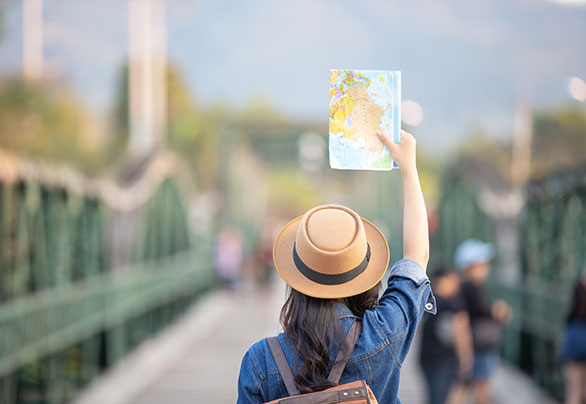
So the vaccines are rolling out amid arguments on who gets what and when. Locally the questions are about eligibility, pecking order, costs, safety, where to go or who can dispense the vaccines. What about blood clots? Are civil rights going to be breached by enforced vaccinations and will travel be limited by new health passport controls? Many people are wondering what kind of world is going to emerge following this unexpected crisis. Some may be fearful and hope for a return to pre-pandemic conditions but others have a vision of a new and positive future fueled by expectations of successful mass vaccinations. Wise owls might ask if vaccines will ever be the cure-all hoped for.
Tourism is vital to the economies of many countries, especially those with smaller or less stable communities and limited natural resources. Globally, millions of jobs and businesses depend on a thriving tourist trade. The World Travel and Tourist Council (WTTC) estimates a threat to around 174 million jobs if the pandemic continues. There is no crystal ball to tell us when it will ever be really over or if/how the world will survive. The current situation is grim, of that we are all certain but what is not clear is how the travel industry was faring even before the Covid-19 virus hit.
Media reports on ailing businesses and failing airlines seem to suggest that tourism was on a downward trend yet the 2019 report from the World Tourism Organization (UNWTO) contradicts this view. The industry accounts for some 10% of global GDP and in the pre-pandemic year 2018-2019 of strong world economies, revenues grew by around 5%. Smiles all round. Fast forward into the summer of 2020 when dire predictions were being made of up to an 80% decline in global tourism and in the first sector of 2021 the official figure showed an actual drop to 85%. Frowns all round.
There is some hope of a rebound from the decline later in 2021 but significant recovery is not expected until late in 2023 or even beyond. Experts are no longer talking of tourism restarting but of the need for a complete shift in thinking. The industry must make a sustainable recovery and, in the future, become more resilient. With so many people’s livelihoods dependent on these factors, it is perhaps time for a review. Shall we stop talking about getting back to before the pandemic but start planning how to move forward in a post-pandemic world? Tourism may have been buoyant before the crisis, but with world economies going into recession and lifestyles permanently changed, a brave new world scenario is beckoning. Vaccinations may only be a starter.
Governments are scrambling to vaccinate communities in droves as if they were cattle so that the monster virus is vanquished so we can all go back to work or school or our swimming pools. The reality is that for many it is too late; too much has been lost, businesses and jobs gone and debts climbing onto their backs. The positives of Covid-19 have had people remembering a community spirit, reminding themselves who lives next door, how parents can spend more time seeing the kids because they can work from home. Hotels, shops and restaurants are starting to reap benefits from staycationers plus businesses and regional transport gaining from locals who no longer feel the need to go further than the town for all their needs. Local economies may be smiling again but for the airlines and associated concerns, the future still remains a bleak image.
The state of the retail trade cannot be divorced from the tourist crisis assessment. Spending from overseas visitors brings significant national and local revenue. The news from the retail front though is not at all doom and gloom with e-commerce coming forward as the savior of the day. This shift in consumer behavior was already well underway before Covid shut down non-essential shops and stores. Customers soon found ways of letting their smart-phones do the shopping, a trend that is likely to continue and should be encouraged for retailers to survive and flourish again. Stores that reopen may need to make cuts in staff or close less productive outlets. Attractive offers, new products and value-for-money goods will be what those wise owls are likely to be advising. Adherence to hygiene standards and government guidelines may encourage a return to consumer confidence in bricks-and-mortar stores. If vaccinations show positive success in their part of the covid war, this double protection should bring back the shoppers and tourists again.
For many who have lost their jobs there are still industries that have continued to expand and hire recruits. Healing may be a long process, but it is also an exciting time of new directions, new opportunities and new hope.
We have used eyes4research for a number of internal product and marketing projects. We have found their services to be professional, accommodating and responsive. The quality of their audience is top notch and their data is very reliable.
The team at Eyes4Research provided us with quick answers to complicated questions. Their personal support allows us to launch surveys at short notice, while the online dashboard makes it easy to analyze responses and visualize the results.
After working with the team from eyes4research, we decided to move all our survey research to online, and now we are able to conduct research fast, less expensive, and with more accurate samples than ever in our business history.
Eyes4Research provided outstanding support managing a large scale survey we conducted in the United Kingdom. The team works with high professional standards, competency and provided timely delivery throughout the project.
The team at Eyes4Research worked with me not only for getting consensus on the presentation, but also accommodated my inclusion criteria without hesitation. Additionally, I loved the dashboard and the features available for reporting.